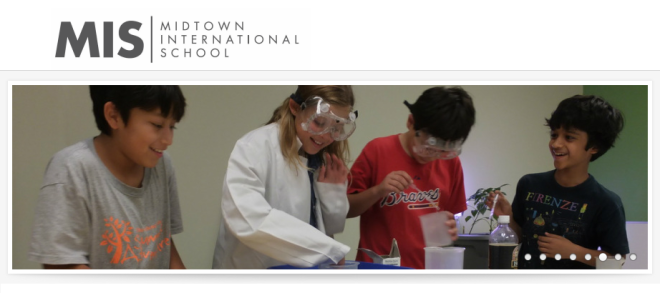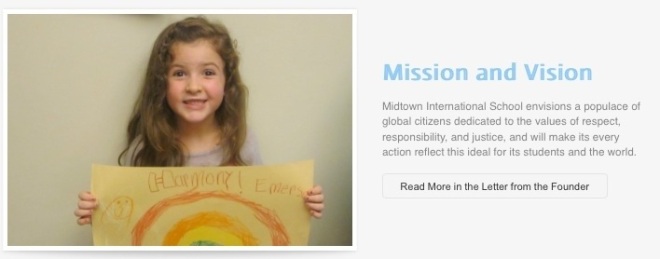By Ande Nokte
 The vision for Midtown International School began over seven years ago in an ambitious strategic plan designed for a dramatically new approach to early learning. It was an exciting and pivotal time in my life: we had just added twins to our family, we were fostering an international high school student, I was beginning to put together applications for my doctoral program, and I decided that starting a preschool would be just the right thing to add to my plate. As a mother of three, a traveler, a philosopher, an avid reader, and a teacher, I had a clear vision for what needed to happen in the first years of life to create lifelong patterns of successful learning. The research was all published; the science was sound; the theories were well-formed and cogent; there were even a few elementary schools beginning to embrace some of the key concepts. The struggle I had, then, was why is no one doing this stuff for preschoolers? So we did. International Preschools moved from a group of four students to 250 students in two campuses in just seven years. It has truly been an adventure and a reward to see those ideas become reality.
The vision for Midtown International School began over seven years ago in an ambitious strategic plan designed for a dramatically new approach to early learning. It was an exciting and pivotal time in my life: we had just added twins to our family, we were fostering an international high school student, I was beginning to put together applications for my doctoral program, and I decided that starting a preschool would be just the right thing to add to my plate. As a mother of three, a traveler, a philosopher, an avid reader, and a teacher, I had a clear vision for what needed to happen in the first years of life to create lifelong patterns of successful learning. The research was all published; the science was sound; the theories were well-formed and cogent; there were even a few elementary schools beginning to embrace some of the key concepts. The struggle I had, then, was why is no one doing this stuff for preschoolers? So we did. International Preschools moved from a group of four students to 250 students in two campuses in just seven years. It has truly been an adventure and a reward to see those ideas become reality.
And here we are, at the seven year mark, bringing the next phase of the strategic plan to reality with Midtown International School. There are a number of things we know and believe about schools and learning:
- small class sizes maximize learning opportunities
- foreign language learning is more successful if it’s done early
- science literacy requires lab time
- music literacy improves dramatically when students learn to play an instrument
- higher order cognitive skills (like analysis, evaluation) require practice
- arts integration creates greater opportunities for many learning styles to interact with the curriculum
- student-planned travel increases retention of knowledge (for language, social and cultural studies, and even math and science standards used in the planning process)
- technology is a fantastic instructor for basic skills
- accountability can be measured in narratives and projects (and what teachers are held accountable for is generally what they will teach)
- primary sources go through fewer layers of interpretation and can be used to create a solid framework for understanding any subject matter
- the degree to which international education is infused into the day to day culture of a school relates directly to the presence of values of tolerance, curiosity, and understanding
- recess and daily physical activity during school hours create a healthier and more successful student population
- subject-matter teachers are more effective when they are subject-matter experts
- teaching via a child’s academic strength can improve upon his or her weaker areas
- understanding and embracing each student’s learning style is as important as differentiating instruction based on sets of skills and abilities
- enthusiasm for learning trumps all other indicators for academic success
- environmental education and awareness are most effective when accompanied by time spent outdoors
I’m sure I could go on and on for pages! Just as I wondered years ago when I started my first school, I now wonder, where is this school? In reality, this laundry list of knowledge isn’t really critical for all, or even many, students. There are dozens of fantastic public and independent schools in the Atlanta area that embrace many of these ideas and do so exceptionally. The students who attend these programs receive an excellent education. Parents choose schools that are a great fit for their family, values, and educational philosophy, and often that means prioritizing the above ideas.
So what do we do for those parents, students, and educators who choose to embrace and expect all of these statements? My experience has been very firmly that if we commit to creating an environment that upholds and stands behind this vision for education, it will become the reality of our school. Some simple changes to the traditional model of independent schools gives MIS viability and sustainability in embracing this high-reaching vision.
First, MIS is committed to keeping tuition and fundraising dollars in the classroom. Avoiding the high costs of excess administrative staff and expensive supply vendors opens the budget 14-18%. Next, smaller class sizes reduce wear and tear on technology, facilities, and, frankly, our teachers. Using instructional technology to introduce basic skills frees up class and instructional time for the invaluable experiences that engage learners at a higher level.
Generating and facilitating community partnerships with Atlanta’s unique and diverse museums, gardens, foundations, and universities leverages resources for our students, teachers, and classrooms. Symbiotically, these partnerships build community awareness and appreciation for these incredible sources of expertise right in our backyard.
Thank you for sharing some of your time with me today. I am always happy to meet to discuss any questions you might have beyond what is covered here. If MIS sounds like it might be a match for your family, please reach out! We look forward to hearing from you!

Midtown International School
500 Amsterdam Ave. NE, Atlanta, GA 30306
admissions@midtowninternationalschool.com
